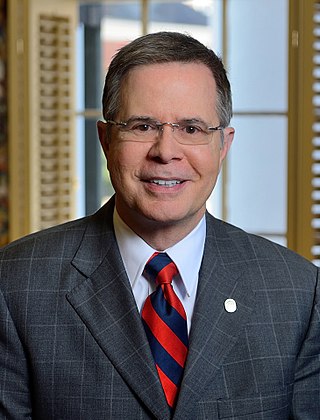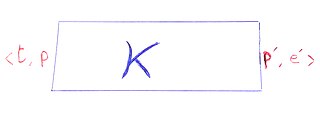In computer science, functional programming is a programming paradigm where programs are constructed by applying and composing functions. It is a declarative programming paradigm in which function definitions are trees of expressions that map values to other values, rather than a sequence of imperative statements which update the running state of the program.
Computer science is the study of the theoretical foundations of information and computation and their implementation and application in computer systems. One well known subject classification system for computer science is the ACM Computing Classification System devised by the Association for Computing Machinery.
In programming language theory, semantics is the rigorous mathematical study of the meaning of programming languages. Semantics assigns computational meaning to valid strings in a programming language syntax.
Axiom is a free, general-purpose computer algebra system. It consists of an interpreter environment, a compiler and a library, which defines a strongly typed hierarchy.

Samson Abramsky is Professor of Computer Science at University College London. He was previously the Christopher Strachey Professor of Computing at Wolfson College, Oxford, from 2000 to 2021.

Jeffrey Scott Vitter is a U.S. computer scientist and academic administrator. Born in 1955 in New Orleans, Vitter has served in several senior higher education administration posts. He is a former chancellor of the University of Mississippi. He assumed the chancellor position on January 1, 2016. His formal investiture to the chancellorship took place on November 10, 2016, at the University of Mississippi's Oxford Campus.

Programming language theory (PLT) is a branch of computer science that deals with the design, implementation, analysis, characterization, and classification of formal languages known as programming languages. Programming language theory is closely related to other fields including mathematics, software engineering, and linguistics. There are a number of academic conferences and journals in the area.
The International Conference on Functional Programming (ICFP) is an annual academic conference in the field of computer science sponsored by the ACM SIGPLAN, in association with IFIP Working Group 2.8. The conference focuses on functional programming and related areas of programming languages, logic, compilers and software development.
The Journal of Functional Programming is a peer-reviewed scientific journal covering the design, implementation, and application of functional programming languages, spanning the range from mathematical theory to industrial practice. Topics covered include functional languages and extensions, implementation techniques, reasoning and proof, program transformation and synthesis, type systems, type theory, language-based security, memory management, parallelism and applications. The journal is of interest to computer scientists, software engineers, programming language researchers, and mathematicians interested in the logical foundations of programming. Philip Wadler was editor-in-chief from 1990 to 2004. The journal is indexed in Zentralblatt MATH.
Gul Agha is a professor of computer science at the University of Illinois at Urbana-Champaign, and director of the Open Systems Laboratory. He is known for his work on the actor model of concurrent computation, and was also Editor-in-Chief of ACM Computing Surveys from 1999 to 2007. Agha was born and completed his early schooling in Sindh, Pakistan. Agha completed his B.S. with honors at the California Institute of Technology in the year 1977. He received his Ph.D. in Computer and Communication Science from the University of Michigan in 1986 under the supervision of John Holland. However, much of his doctoral research was carried out in Carl Hewitt's Message-Passing Semantics Group at Massachusetts Institute of Technology (MIT). Agha's dissertation was published by the MIT Press as Actors: a model of concurrent computation in distributed systems, a book which, according to the ACM Guide to Computing Literature, has been cited over 3000 times.

Mihalis Yannakakis is professor of computer science at Columbia University. He is noted for his work in computational complexity, databases, and other related fields. He won the Donald E. Knuth Prize in 2005.

Yuri Gurevich, Professor Emeritus at the University of Michigan, is an American computer scientist and mathematician and the inventor of abstract state machines.

Ronald Fagin is an American mathematician and computer scientist, and IBM Fellow at the IBM Almaden Research Center. He is known for his work in database theory, finite model theory, and reasoning about knowledge.
Algorithmica is a monthly peer-reviewed scientific journal focusing on research and the application of computer science algorithms. The journal was established in 1986 and is published by Springer Science+Business Media. The editor in chief is Mohammad Hajiaghayi. Subject coverage includes sorting, searching, data structures, computational geometry, and linear programming, VLSI, distributed computing, parallel processing, computer aided design, robotics, graphics, data base design, and software tools.

Computational and Mathematical Organization Theory is a quarterly double-blind peer-reviewed scientific journal covering the field of organization theory. The journal is published by Springer Science+Business Media. It was established in 1995 and initially published by Kluwer. The founding editors-in-chief were William A. Wallace and Kathleen Carley. Carley has continued as co-editor-in-chief, a role she currently shares with Terrill L. Frantz.

Ruy J. Guerra B. de Queiroz is an associate professor at Universidade Federal de Pernambuco and holds significant works in the research fields of Mathematical logic, proof theory, foundations of mathematics and philosophy of mathematics. He is the founder of the Workshop on Logic, Language, Information and Computation (WoLLIC), which has been organised annually since 1994, typically in June or July.

In theoretical computer science, the Krivine machine is an abstract machine. As an abstract machine, it shares features with Turing machines and the SECD machine. The Krivine machine explains how to compute a recursive function. More specifically it aims to define rigorously head normal form reduction of a lambda term using call-by-name reduction. Thanks to its formalism, it tells in details how a kind of reduction works and sets the theoretical foundation of the operational semantics of functional programming languages. On the other hand, Krivine machine implements call-by-name because it evaluates the body of a β-redex before it applies the body to its parameter. In other words, in an expression u it evaluates first λx. t before applying it to u. In functional programming, this would mean that in order to evaluate a function applied to a parameter, it evaluates first the function before applying it to the parameter.
Deepak Kapur is a Distinguished Professor in the Department of Computer Science at the University of New Mexico.
Dale Miller is an American computer scientist and author. He is a Director of Research at Inria Saclay and one of the designers of the λProlog programming language and the Abella theorem prover.








